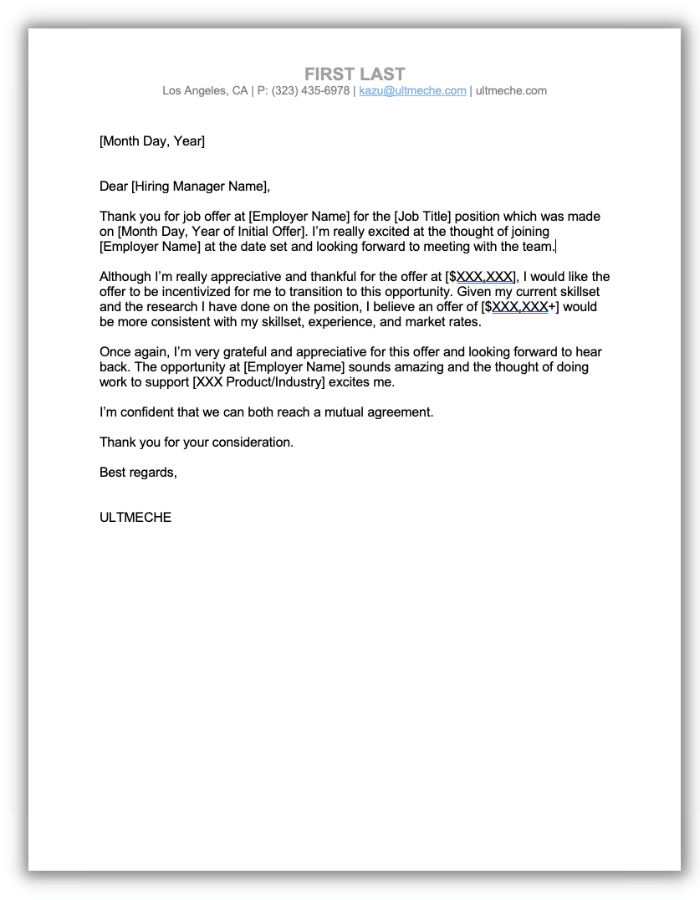If you need to know how to write a salary negotiation letter, then congrats!
This means you’ve officially gotten the hardest parts of getting a job out of the way. You know how to write a resume, how to interview, and all you need to is to know how to write a salary negotiation letter.
The good news is that it’s easy from here on out.

Salary Negotiation Letter Example

First Paragraph
Thank you for job offer at [Employer Name] for the [Job Title] position which was made on [Month Day, Year of Initial Offer]. I’m really excited at the thought of joining [Employer Name] at the date set and looking forward to meeting with the team.
What you should aim to do in the first paragraph of your salary negotiation letter is to thank them for the offer and show your excitement to join the team. You’re going to be excited about the opportunity which puts the paragraph in a positive sentiment.
Second Paragraph
Although I’m really appreciative and thankful for the offer at [$XXX,XXX], I would like the offer to be incentivized for me to transition to this opportunity. Given my current skillset and the research I have done on the position, I believe an offer of [$XXX,XXX+] would be more consistent with my skillset, experience, and market rates.
This is where you go for the money. You’re going to phrase it in a way that you want to be “incentivized to transition into the company. Employers know what this means, money. You can’t simply just say you want more money – it’s not gonna play out well and you’ll look immature and entitled.
You’re going to do some research regarding market rates and use that as additional justification. Additionally, you can specify your specific business impacts and accomplishments such as saving money or cutting back on costs, which companies can use to justify paying you more.
Third Paragraph and Closing
Once again, I’m very grateful and appreciative for this offer and looking forward to hear back. The opportunity at [Employer Name] sounds amazing and the thought of doing work to support [XXX Product/Industry] excites me.
You’re going to close the paragraph with positive sentiment again, and you’re going to express appreciation and excitement.
From this point on, expect a call back from the hiring manager or an email with a counter offer.
The employer may come back and say no, but you have absolutely nothing to lose by doing this.
Do Your Research On Salary Negotiation
Make sure you do your research on salary negotiation. Don’t come in blind and ask for an arbitrary number. You should be doing this prior to applying for the job and throughout the job interview phase, you should have an idea of the salary you want.
Use sources such as salary.com, indeed.com, and Glassdoor to determine what the salary you should be looking for is based on your skills and experience. Ask friends, family, and colleagues about salaries for positions that you’re interested in.
Salary transparency is also becoming very common and it’s easy to find out what the pay is for certain positions.
Make sure you also learn about things such as open enrollment and benefits.
What To Expect When You Present The Salary Negotiation Letter
If you are presented an offer, either physically or through email, the ball is now in your court.
Regarding salary negotiation, this can be either done verbally or through mail – in this case we’re going over how to write a salary negotiation letter.
Wait a few hours or 1 day and present the salary negotiation letter to the recruiter or hiring manager. Be prepared for them to either call you back, or to wait a few days for them to respond.
HR / Recruiters / Hiring Managers will respond in 1 of 3 ways:
- They will accept your counter offer and represent you with the offer letter that meets those needs
- They will say no to the counter offer that you have presented
- Reject the counter offer, but open to negotiation in other ways (PTO, benefits, sick time, 401K, stock options, etc.)
Become Outcome Independent
The biggest tip that we can give on being successful with salary negotiation is to come in with an abundance mindset. This means that you will be outcome independent no matter what.
For instance, if one employer offered you a job, but didn’t meet your counter offer requirements – you simply say no and move on to the next one. You are 100% able to do this if you market yourself well in the job market and have the skills/accomplishments to back it up.
Personally, having about 8 years of experience in the engineering industry makes me very attractive as an employee. Recruiters are constantly hitting me up on LinkedIn through DMs regarding high paying $180K+ positions. If this isn’t you, then you need to be setting up the foundation for yourself accordingly.
Build skills, increase outreach as much as possible, and watch the number of interview requests and offer letters you get skyrocket.
Closing Thoughts On Learning How To Write A Salary Negotiation Letter
Although the thought of salary negotiation is scary, it really isn’t. Salary negotiation is very common in the industry. Do not feel entitled to ask for more money – make sure you have a clear business justification on why you should be paid more.
Business justifications that you can use for salary negotiation include:
- Rare and high in-demand skills
- Proven accomplishments in the industry
- Doing the proper research regarding market rates
Present those business justifications along with your argument for salary negotiations, and you should see the employer respond positively.
Employers expect you to negotiate salary.
According to a study done by Fidelity, 85% of those who have negotiated have been successful:

You have absolutely nothing to lose by negotiating salary. The worst that an employer will do is say no. You do not need to be scared about employers rescinding an offer.
It costs employers thousands of dollars to go through the interviewing process with you. When they present you a job offer, they mean it. Think about the salaries of recruiters, hiring managers, and associated overhead costs such as software ultimately cost for companies. It’s alot of money.
About the author

Kazuyoshi Fujimoto, PE
Founder | Engineering Career Coach | Principal Mechanical Engineer
Kazu oversees all of ultmeche’s engineering services. He provides consulting such as resume reviews, rewrites, mock interviews, and all services career related. Additionally, Kazu performs consulting work regarding Oil & Gas, Automotive, and Aerospace & Defense. Kazu is licensed as a professional engineer in the state of California and has 9+ years of experience in Oil & Gas, Automotive, and Aerospace & Defense.
